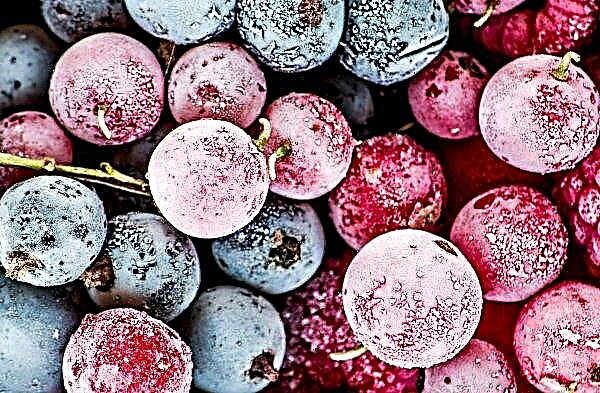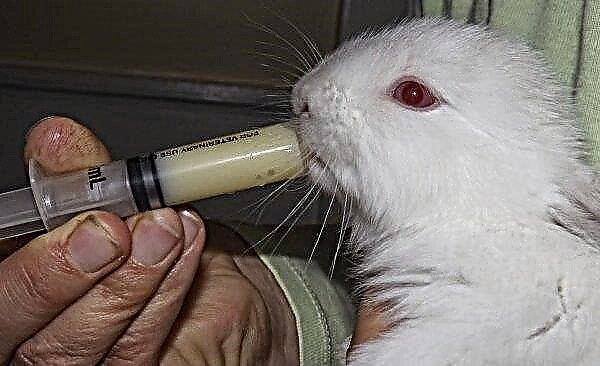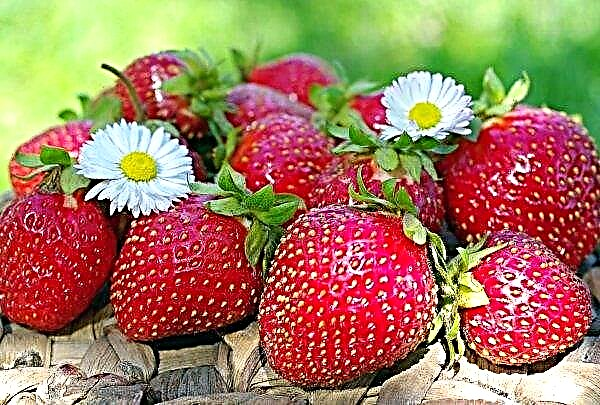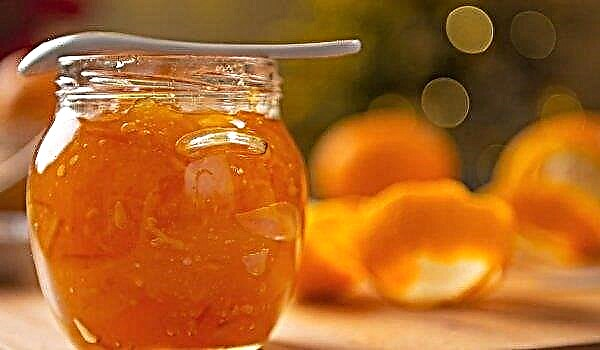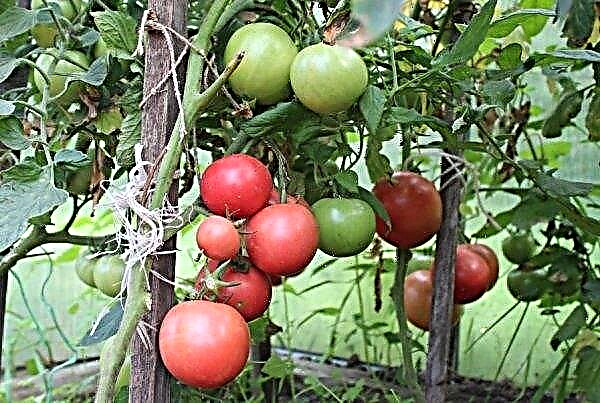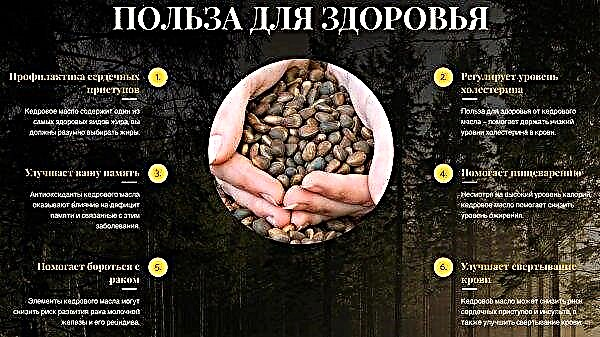The useful properties of raspberries have been known since ancient times, so it is not surprising that today the culture is grown in summer cottages in order to obtain tasty and healthy berries. What exactly is their benefit and how to properly use a fetus for a woman while breast-feeding a baby - read on.
Chemical and vitamin composition
About 90% of the total volume of raspberry fruits is water. But, in addition to it, the berries contain glucose, sucrose, fructose, essential purines, nitrogenous substances, organic acids (in particular, salicylic, citric, malic and folic), carotene, copper, iron, potassium salts, vitamins P, PP , C, E, groups B (B1, B2, B6), each of which has a certain positive effect on the body:
- folic acid, iron and copper have a beneficial effect on blood-forming processes in the body;
- carotene takes part in the synthesis of vitamin A, which, in turn, affects the metabolic processes in proteins and normalization of vision;
- potassium enhances urine diversion and improves the condition of the cardiovascular system;
- B vitamins are involved in metabolic processes and play an important role in the formation of proteins;
- Vitamin E promotes fat metabolism;
- Vitamin PP provides the normal course of biological oxidation processes.
 Useful is not only the composition of raspberry berries, but also the constituent components of leaves, flowers, shoots and even the roots of the plant, so infusions, decoctions and teas are often prepared from them for a variety of problems.
Useful is not only the composition of raspberry berries, but also the constituent components of leaves, flowers, shoots and even the roots of the plant, so infusions, decoctions and teas are often prepared from them for a variety of problems.
Useful and harmful properties
All of the listed beneficial properties of raspberries are just the beginning of its positive characteristics. When harvesting berries for the winter, the main emphasis is on the antimicrobial and antipyretic abilities of the plant, which is especially important during the mass spread of viral ailments and colds.
- In addition, the fruits, shoots and even leaves of a plant can have the following effects on the human body:
- contribute to the stabilization of digestive processes, eliminating problems with constipation, including in nursing mothers;
- activate regenerative processes in the body, thereby causing the rapid healing of damaged tissues and effective blood renewal;
- contribute to rapid weight loss after childbirth, since raspberry fruits contain a minimum of calories;
- strengthens blood vessels and lower cholesterol;
- normalize appetite;
- eliminate abdominal pain and reduce the manifestations of nausea;
- normalize the condition of the skin (in particular, improve complexion);
- restore the normal hormonal background of the body;
- help get rid of diarrhea, for which you just need to prepare a decoction based on the leaves of the plant.

Unfortunately, in spite of all the indicated benefits of winter preparations or fresh raspberries, drinks and jam from it can have some negative consequences of consumption. First of all, we are talking about people who are prone to allergic reactions or who have individual intolerance to the constituent components of the plant (for example, salicylic acid). In addition, a large number of berries eaten can complicate the condition with gout and kidney diseases, not to mention the acute form of gastrointestinal ailments, which also occur in young mothers.
Important! If possible, light foods should first be introduced into the diet of a nursing woman, and only then move on to the use of red and other bright berries or fruit fruits.
Can I use raspberries while breastfeeding
The answer to this question depends on the age of the child and the duration of lactation. Any food product at this time will have a certain effect both on the mother’s body and on the baby’s emerging body, and in the first months of his life this effect will be much more noticeable than after six months of active breastfeeding, which any mother should definitely consider.
Effect on Lactation
Many women justifiably consider raspberry tea a natural way to increase the production of breast milk, the main thing is to drink the drink in a warm form and 30-50 minutes before the baby is applied to the breast. At the same time, it is not worth abusing the infusion and it is enough to drink 1-2 cups of liquid per day, three to four times in seven days.

It is better to prepare a drink on your own, using only fresh fruits and avoiding artificial preservatives or additives. In addition, each new serving of tea should be freshly brewed, as long-term infusion of the product may spoil, and it should not be warmed up.
Did you know? In addition to the traditional red and yellow raspberries, purple raspberry berries are found today. For the first time such a culture was bred in 1893, crossing black and red varieties.
If the usual steamed leaves do not suit you, you can add the infusion to the usual black tea leaves, but only without chemical constituents, such as artificial flavors. Packaged teas will not work here, but natural leafy varieties will be very useful.
Strongly malting the finished drink is not necessary, because in the fruits of raspberries, and even more so in jam from them, there is already enough sweetness that does not require the use of an additional portion of sugar.

When feeding a three-month-old baby or an older child, you can add lemon to raspberry tea, which perfectly enhances the antiviral and anti-inflammatory effects of raspberries on the mother's body. Getting along with milk to the baby, raspberry-lemon drink helps to strengthen his body, which is especially true in the cold season.
At the same time, do not forget that each of the additional ingredients of raspberry tea should be administered in turn, carefully studying the baby's reaction to such additions. The increased amount of milk for HB cannot guarantee the complete absence of allergic manifestations, in addition, the baby may not like the changed taste of nutrition.
Influence on the child
The effect of raspberries on a child’s body is similar to the effect of berries on maternal health, however, it is important to consider the greater tendency of children to allergic manifestations. Therefore, in order to derive only benefit from tea, it is important to use a dosage of berries when brewing it.
 Freshly, a nursing woman can eat no more than a handful of raspberries per day, at the initial stages dividing this amount into several servings (they are eaten during the day).
Freshly, a nursing woman can eat no more than a handful of raspberries per day, at the initial stages dividing this amount into several servings (they are eaten during the day).
Of course, you can use a little more raw materials for preparing a drink, but in this case, you need to increase its amount gradually (up to 100-150 g per day) in order to prevent the baby from having a rash or diathesis.
After eating fresh berries, it is better to feed the baby no earlier than an hour later, trying to choose the morning hours. In this case, you will have time to observe the reaction of the crumbs to the new product, which can not be said about night breastfeeding: both the mother and the baby will sleep, and any side effects may become noticeable only in the morning.
Did you know? A physiologically healthy woman can continue breastfeeding a child up to 5-6 years, but most experts advise staying at one and a half or two years.
Contraindications
- Despite the many positive reviews about the beneficial properties of raspberry fruit, everyone who suffers from the following problems should be careful about consuming this product:
- high blood sugar;
- gout
- problems with the kidneys and urinary ducts;
- ulcers and gastritis.
In addition, women during lactation should not use concentrated juice of berries, which can be replaced with fruit drinks, tea or all kinds of infusions based on fruits, leaves or shoots.

As you can see, the use of raspberries during breastfeeding is allowed, but in order to avoid possible negative consequences, it is worth making sure that there are no contraindications listed and not abusing the berries, trying to make drinks and consuming fresh fruits less.


